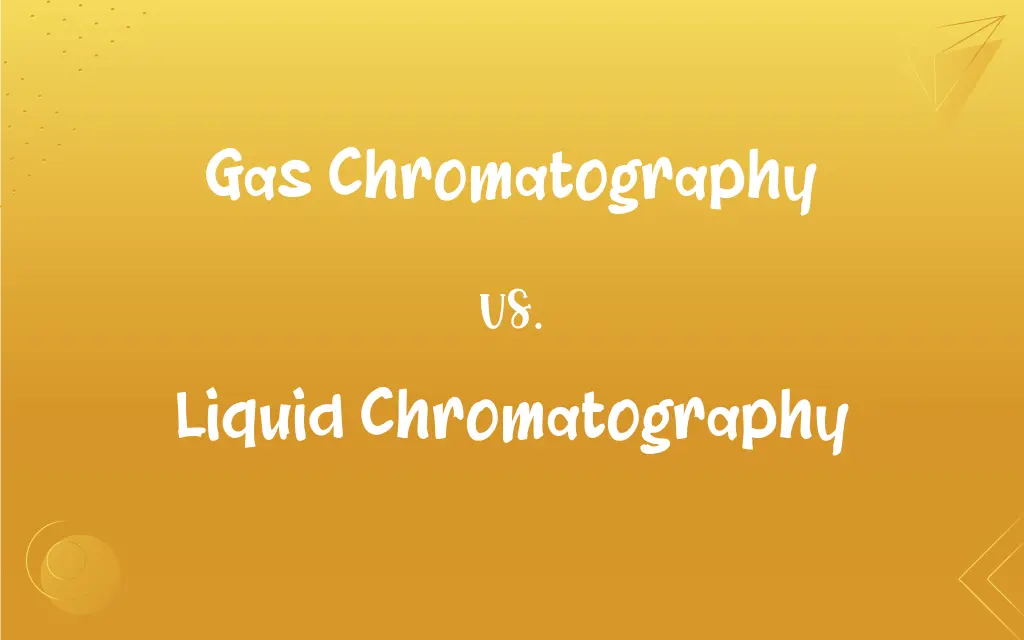Gas Chromatography vs. Liquid Chromatography: What's the Difference?
Edited by Janet White || By Harlon Moss || Published on March 3, 2024
Gas chromatography separates compounds in a gas phase using a carrier gas, while liquid chromatography separates compounds dissolved in a liquid mobile phase.

Key Differences
Gas chromatography (GC) involves vaporizing samples and passing them through a column with a carrier gas, allowing separation based on volatility. Liquid chromatography (LC), on the other hand, separates compounds dissolved in a liquid phase, based on their interaction with the column's stationary phase.
In GC, compounds are separated based on their boiling points and affinity towards the column material. LC separates compounds primarily on their polarity, size, or other chemical properties, depending on the type of LC used.
GC requires compounds to be volatile and thermally stable, limiting its use to smaller, non-reactive molecules. LC can be used for a broader range of substances, including larger biomolecules like proteins, which are not stable in the gas phase.
The detectors used in GC typically respond to changes in heat conductivity or ionization, whereas LC uses detectors like UV-Vis spectrophotometers, which are sensitive to the absorbance of compounds.
GC is widely used in forensic science, environmental analysis, and the petrochemical industry, while LC is essential in pharmaceuticals, biotechnology, and food analysis for its versatility in handling diverse compound types.
ADVERTISEMENT
Comparison Chart
Phase of Samples
Gas phase
Liquid phase
Separation Basis
Boiling points, volatility
Polarity, size, chemical properties
Sample Requirements
Volatile, thermally stable compounds
Suitable for a wide range, including large biomolecules
Common Detectors
Heat conductivity, ionization detectors
UV-Vis spectrophotometers, refractive index detectors
Application Areas
Forensic science, environmental analysis, petrochemicals
Pharmaceuticals, biotechnology, food analysis
ADVERTISEMENT
Gas Chromatography and Liquid Chromatography Definitions
Gas Chromatography
GC separates compounds based on volatility and boiling points.
GC is employed in the petrochemical industry for analyzing crude oil components.
Liquid Chromatography
LC is essential in biotechnology and food analysis.
LC is employed to analyze the nutritional content in food products.
Gas Chromatography
Gas chromatography separates compounds in a gas phase using a carrier gas.
GC is used to analyze the composition of perfumes.
Liquid Chromatography
It uses various detectors like UV-Vis spectrophotometers.
LC coupled with a UV detector is used for quantifying vitamins in supplements.
Gas Chromatography
It involves vaporizing samples for analysis.
In GC, environmental air samples are vaporized for pollutant analysis.
Liquid Chromatography
Liquid chromatography separates compounds dissolved in a liquid mobile phase.
LC is used for purity testing in pharmaceutical manufacturing.
Gas Chromatography
It requires compounds to be volatile and thermally stable.
GC is ideal for analyzing volatile organic compounds in forensic investigations.
Liquid Chromatography
LC is suitable for a wide range of substances, including biomolecules.
LC is used to analyze proteins in biological research.
Gas Chromatography
GC uses specific detectors like flame ionization detectors.
GC with a flame ionization detector is used to analyze hydrocarbons in the gas phase.
Liquid Chromatography
It separates based on compound polarity or size.
In LC, different food dyes are separated based on their polarity.
FAQs
What is gas chromatography?
Gas chromatography is a technique for separating and analyzing compounds in the gas phase.
What is liquid chromatography?
Liquid chromatography is a method for separating substances dissolved in a liquid mobile phase.
What types of samples are suitable for GC?
GC is suitable for volatile and thermally stable compounds.
What are the applications of LC?
LC is used extensively in pharmaceuticals, biotechnology, and food analysis.
How does GC separate compounds?
GC separates compounds based on their boiling points and interaction with the column.
What is a typical detector used in GC?
Common detectors in GC include flame ionization and mass spectrometers.
What sample preparation is required for GC?
GC often requires sample vaporization and may need derivatization for certain compounds.
Is GC suitable for heat-sensitive compounds?
No, GC is not suitable for heat-sensitive compounds due to the vaporization process.
Can LC analyze large biomolecules?
Yes, LC can be used to analyze large biomolecules like proteins.
What detectors are used in LC?
LC often uses UV-Vis spectrophotometers and refractive index detectors.
What basis does LC use for separation?
LC separates compounds based on polarity, size, or specific chemical properties.
How does temperature affect GC analysis?
Temperature in GC affects the volatility and separation of compounds in the column.
Which industries commonly use GC?
GC is widely used in environmental analysis, forensic science, and the petrochemical industry.
How is LC used in food analysis?
LC is used in food analysis to identify and quantify various components like additives and nutrients.
Can GC separate non-volatile salts?
GC cannot separate non-volatile salts as they do not vaporize efficiently.
Can LC analyze volatile organic compounds?
LC can analyze some volatile compounds, but GC is generally more suitable for volatiles.
What is high-performance liquid chromatography (HPLC)?
HPLC is a type of LC that uses high pressure to increase resolution and speed of separation.
Is GC used in drug development?
GC is used in drug development for analyzing volatile solvents and reaction products.
Are GC and LC compatible with mass spectrometry?
Both GC and LC can be coupled with mass spectrometry for detailed analysis.
Can LC handle acidic or basic samples?
LC can handle a wide range of pH, including acidic and basic samples, depending on the column and mobile phase used.
About Author
Written by
Harlon MossHarlon is a seasoned quality moderator and accomplished content writer for Difference Wiki. An alumnus of the prestigious University of California, he earned his degree in Computer Science. Leveraging his academic background, Harlon brings a meticulous and informed perspective to his work, ensuring content accuracy and excellence.
Edited by
Janet WhiteJanet White has been an esteemed writer and blogger for Difference Wiki. Holding a Master's degree in Science and Medical Journalism from the prestigious Boston University, she has consistently demonstrated her expertise and passion for her field. When she's not immersed in her work, Janet relishes her time exercising, delving into a good book, and cherishing moments with friends and family.































































